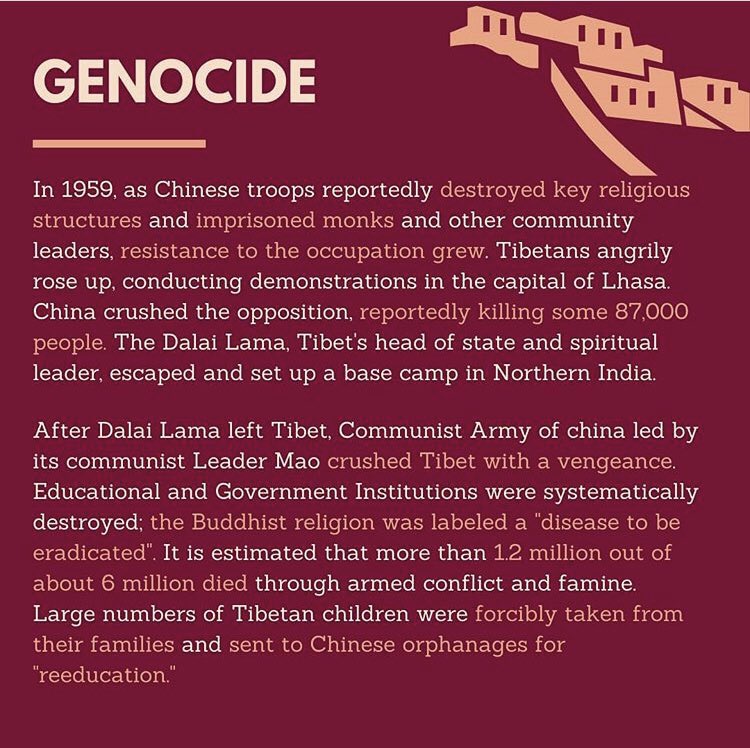
SAHF is excited to present a thread and several slides on Tibet, specifically its history, the Chinese occupation, the religious persecution of Buddhists by the Chinese State, and the cultural genocide that China has actively precipitated in Tibet.
Swipe Through! 👇
Swipe Through! 👇

For history, Tibet is a devoutly Buddhist area that was relatively isolated from the rest of the world, although it had a strong Sanskritic influence from India. For centuries, Tibet was predominated by a pastoral society with a hegemony of hierarchal Buddhist monasteries. 

Before the Chinese occupation of Tibet, at least one boy from families in Tibet were expected to study in a Buddhist monastery and were educated in Buddhist philosophy, religious rites, and Tibet’s culture. Monasteries also acted as refugee for Tibetans during extreme weather. 

However, in 1949, China attacked Tibet & tried to persuade the Tibetan government to begin negotiations of “peaceful liberation”. However, when the Tibetans resisted, Chinese forces attacked again, though they still hoped to legitimize themselves through the Dalai Lama. 

However, due to a lack of international support for their cause, including from Britain and India, a Tibetan delegation signed the “17-Point Agreement” without the permission or knowledge of the Dalai Lama, which resulted in Tibet’s sovereignty being handed over to China. 

Following China’s occupation of Tibet, Chinese troops destroyed key religious structures, imprisoned Buddhist monks, & crushed the opposition by reportedly killing some 87,000 people. The Dalai Lama also fled Tibet to seek refuge in India during this time & oppression set in. 

To this day, Chinese authorities in Tibet continue to restrict religious freedom, speech, movement, & assembly, & they refuse to redress popular concerns about mining and land grabs by local officials working for the Chinese state. Many cases of land grabbing have been reported. 

The oppression by the Chinese state was so gruesome that 1 million Tibetans tried to escape to India, Nepal, and Bhutan, though only about 110,000 survived the journey over the Himalaya as they either surrendered to the Chinese authorities who caught them or died trying to flee. 

Tibet has one the worst human rights crises in the world today. Even Tibetan children are not spared and are often denied the opportunity to learn in their mother tongue, and all Tibetans virtually have no freedom of religion, speech, or other liberal constitutional guarantees. 

The situation in Tibet is so grave that Freedom House, a US Watchdog, has listed Tibet as the second-least-free country in the world, only behind Syria. The occupation of Tibet by Chinese authorities and the continuing oppression and cultural genocide calls on us to #FreeTibet! 

• • •
Missing some Tweet in this thread? You can try to
force a refresh












